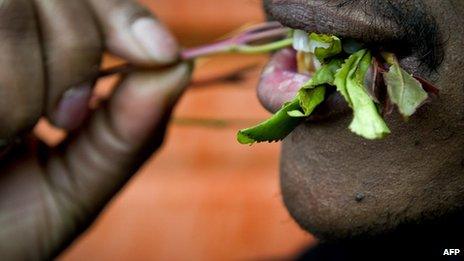Kenya appeals to UK not to ban khat
- Published

Kenyan MPs have appealed to the UK not to "condemn people" by banning the herbal stimulant khat.
The leafy substance, grown by many Kenyan farmers, was of economic and cultural significance to many Africans, MP Florence Kajuju told the BBC.
The UK government has decided, against the advice of its own experts, to treat khat as a class C drug to "protect vulnerable members of our communities".
It is traditionally used by Ethiopian, Kenyan, Somali and Yemeni communities.
The mildly narcotic leaf is already banned in most of Europe and in a number of other countries, including the US and Canada.
Ms Kajuju led a team of Kenyan MPs to the UK to lobby the government not to follow suit.
In July, UK Home Secretary Theresa May said khat would be banned "at the earliest possible opportunity" but a ban has yet to be imposed.
'Offered at marriage proposals'
"If you pass a law classifying miraa [a Somali and Swahili word for khat] as a class C drug, then you are condemning our people," she told the BBC's Focus on Africa radio programme.
Many farmers in Kenya grew khat which they exported, she said.
"If it is banned in the UK, it means the economy of our people is going to suffer," Ms Kajuju added.
Khat was also of cultural significance, with families offering a bag of it when proposing marriage and if the woman accepted it it meant she had accepted the proposal, Ms Kajuju said.
She said the UK should not fall for "misinformation" about khat.
"The first thing my grandmother introduced me to is a bite of khat. It's good," Ms Kajuju told the BBC.
In Kenya, priests accept it at churches "as a crop you are offering to god", she added.
Ms May said the stimulant would be banned as the risks it posed could have been underestimated by the government's Advisory Council on the Misuse of Drugs (ACMD).
In January, it said there was "insufficient evidence" that khat caused health problems.
Ms May said the government also needed to act to prevent the UK from becoming "a single, regional hub for the illegal onward trafficking" of khat.
The ACMD found "no evidence" khat, made from leaves and shoots of a shrub cultivated in the Horn of Africa and the Arabian Peninsula, and containing the stimulant cathinone, was directly linked with serious or organised crime.
Somali groups in the UK had told the ACMD that use of khat was a "significant social problem" and said it caused medical issues and family breakdowns.
The ACMD said withdrawal symptoms such as tiredness and depression were associated with khat, and recommended that the public should be educated about this where necessary.
- Published13 July 2013
- Published23 January 2013
- Published26 January 2012
- Published16 January 2013